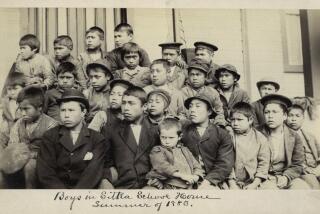Governor Aims to Change Idaho’s Tainted Image
- Share via
BOISE, Idaho — When Phil Batt was a kid during World War II, he saw Japanese-Americans interned. Then there was the exploitation of Mexican farm workers.
As a soldier, he remembers being deeply troubled by the unequal treatment of blacks, who rode at the back of the bus and had to step off sidewalks for whites.
“That didn’t look right to me. It was probably the most profound influence I had,” Batt says, recalling his basic training days in pre-integration Mississippi.
Today, as Idaho’s Republican governor, the 70-year-old Batt is making civil rights a defining theme of his administration. It’s personal, he says, but also pragmatic: In recent years, his state has received as much publicity for its extremists as for its famous potatoes.
“Bigotry and racial discrimination are a part of humankind. It’s always existed; it always will. And Idaho is not without its problems,” Batt says. “But I think those of us who hold high positions should, on the proper occasions, try to lead our people in a better understanding.”
In recent weeks, Batt has spoken out repeatedly against what he considers Idaho’s undeserved national image.
In his State of the State address, in his Martin Luther King Jr.-Idaho Human Rights Day speech, and in welcoming 2,600 members of the all-black National Brotherhood of Skiers to Sun Valley, Batt repeated the same message:
Idaho is getting a bum rap “because of a handful of malcontents and screwballs who have chosen to make their home here.”
State residents are sensitive to the tainted image, and most applaud the governor for speaking out against fringe groups like the Aryan Nation, which wants to observe Adolf Hitler’s April 20 birthday with a parade in Coeur d’Alene.
“When I travel out of state, people know two things about Idaho. They say, ‘Oh, you grow potatoes.’ And then they say, ‘Oh, you’ve got those right-wing groups there,”’ said Richard Baker, a sociology professor who teaches ethnic studies at Boise State University.
Batt’s commitment to civil rights in the virtually all-white state is not new.
In years past, he drafted legislation that created the Idaho Human Rights Commission, pressed for a state holiday honoring King, pursued a rapprochement with Indian tribes, launched Latino self-help initiatives and persuaded the Legislature to extend workers’ compensation coverage to farm laborers, primarily Latino.
Most recently, he asked the Legislature to appropriate money for an Idaho representative to attend meetings of the Northwest Coalition Against Malicious Harassment.
“He’s the civil rights governor. This is how he wants to be remembered,” said Marilyn Shuler, retiring executive director of the Idaho Human Rights Commission. “It’s just who he is.”
Batt, who is retiring after this year, dismisses suggestions that he is working on his legacy.
“I’ll be remembered, accurately or inaccurately, according to what record I’ve made,” he says, noting he’s worked for civil rights progress throughout his life.
Besides being right, he and his supporters say, it’s in Idaho’s economic self-interest to fight the reputation for intolerance.
“Companies like ours have difficulty in attracting people of color to work in Idaho, and some find it difficult or tend not to stay once they do relocate,” says Mark Falconer, public affairs manager for Hewlett-Packard Inc., which employs 4,000 people in Boise.
More state money for Human Rights Commission outreach work would help, Falconer says, but the growing number of multinational companies in Idaho and the state’s increasing reliance on foreign trade eventually will force the culture to conform with the image Batt and others want to project.
Of Idaho’s 1.2 million people, 91% are white. Only about 6,500 are black. Even Latinos, Idaho’s largest minority, number fewer than 100,000.
The state is also solidly Republican and conservative. U.S. Rep. Helen Chenoweth has received national attention--and criticism--for her comments indicating support for militia groups and questioning whether Latinos would want to work in chilly northern Idaho.
“They’re not necessarily racist, but they relay an attitude that somehow we’re different,” said Ernesto Sanchez, a Boise lawyer and immediate past president of the Idaho Hispanic Caucus. “Pretty soon people think, ‘If those guys can elect a Helen Chenoweth, they must all be racist.’ Certainly that’s not true.”
Chenoweth says her statements have been misunderstood.
As to Batt’s civil rights initiatives, she told the Associated Press:
“Although government has done some good in taking some evil and stupid laws off the books and giving minorities their constitutional rights, I don’t think it is the role of government, by force or fiat, to force this issue. I think we should be the kinds of people that others would be attracted to.”
Batt passes no judgment on those who are not so vocal as he is in support of civil rights.
“What other people do is their own business,” he says, calling the subject “rather personal.”
His own views stem from experiences growing up on a farm in southwestern Idaho. “My mother was a great believer in tolerance, and she gave me a lot of advice,” he says.
“When I was young, the war was on. We saw the expatriation of Japanese-Americans to camps.” In the Army, he witnessed bias against black Americans.
He didn’t object but remembers, “I was struck by the different treatment people got. I remember in some business establishments they made it apparent that people of other descents were not welcome--’Mexicans and dogs stay away.’ It was contrary to what my mother taught me.”
More to Read
Sign up for Essential California
The most important California stories and recommendations in your inbox every morning.
You may occasionally receive promotional content from the Los Angeles Times.













